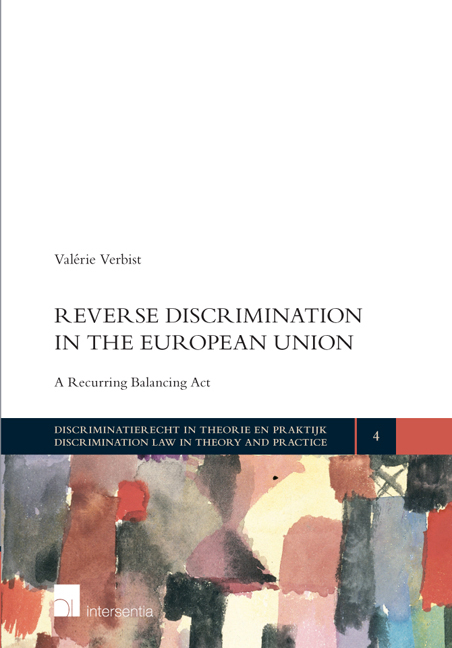Book contents
Part I - Reverse Discrimination from a Union Perspective
Published online by Cambridge University Press: 29 September 2018
Summary
Part I examines the issue of reverse discrimination from a Union perspective. It is the Court of Justice's settled case law that reverse discrimination is not prohibited by Union law because the Treaty provisions on free movement and Union citizenship do not apply to purely internal situations. Accordingly, the Member States have to decide individually whether or not to remedy situations of reverse discrimination. The aim of Part I is to answer the first research question: to what extent does reverse discrimination continue to fall within the scope of the law of the Member States and when does it fall within the ambit of Union law?
Chapter 2 provides an analysis of the ECJ's case law on reverse discrimination from the very first cases to the most recent ones. The arguments justifying and questioning this case law will be discussed, taking new developments in Union law into account, and the creation of Union citizenship particularly. After balancing all of these elements, the position will be taken that reverse discrimination still falls outside the scope of Union law.
The real problem with the ECJ's case law on reverse discrimination seems to lie in its interpretation of what constitutes a purely internal situation. In particular, the unpredictability of whether or not the ECJ will consider a concrete case to be purely internal can be seriously criticised. This assessment's consequences are far-reaching: if a sufficient link with Union law is found, the situation falls under Union law; if no such link is found, by contrast, the situation is purely internal and reverse discrimination may occur. Chapter 3 provides an analysis of the ECJ's interpretation of purely internal situations. Finally, some recommendations on how to make this interpretation more clear and straightforward are given.
The study of reverse discrimination from a Union perspective should not examine the ECJ's purely internal situation rule as being an isolated doctrine, but should instead involve general principles of EU law and other ECJ doctrines. Accordingly, involved inter alia in this analysis are the principle of conferral, the ECJ's case law on restrictions of free movement, the ECJ's case law on internal tariffbarriers and the Dzodzi and Guimont lines of cases.
- Type
- Chapter
- Information
- Reverse Discrimination in the European UnionA Recurring Balancing Act, pp. 19 - 20Publisher: IntersentiaPrint publication year: 2017

